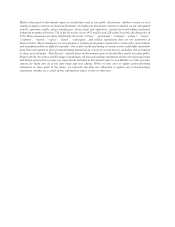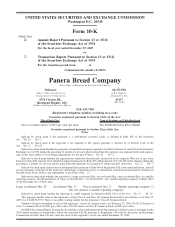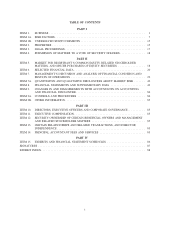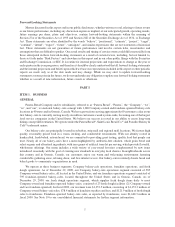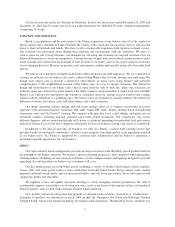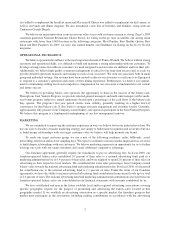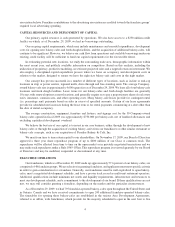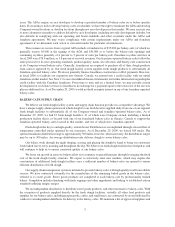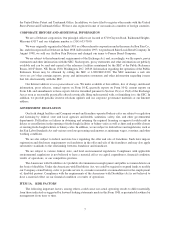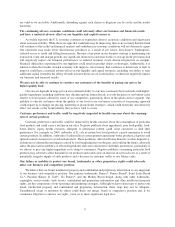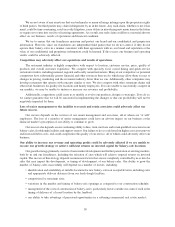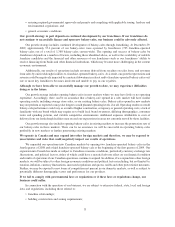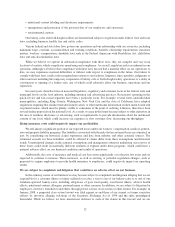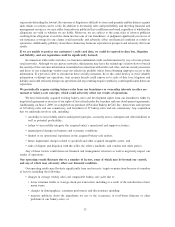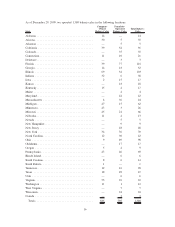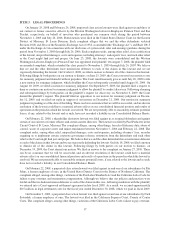Panera Bread 2009 Annual Report Download - page 14
Download and view the complete annual report
Please find page 14 of the 2009 Panera Bread annual report below. You can navigate through the pages in the report by either clicking on the pages listed below, or by using the keyword search tool below to find specific information within the annual report.Disruptions in our bakery-cafe supply chain could adversely affect our profitability and operating
results.
Our Company-owned and franchise-operated bakery-cafes depend on frequent deliveries of ingredients and
other products. One company delivers the majority of our ingredients and other products to our bakery-cafes on a
regular basis (two or three times weekly). In addition, we and our franchisees rely on a network of local and national
suppliers for the delivery of fresh produce (three to six times per week), which is particularly susceptible to supply
volatility as a result of weather conditions. Our dependence on frequent deliveries to our bakery-cafes by a single
distributor could cause shortages or supply interruptions that could adversely impact our operations.
Although many of our ingredients and products are prepared to our specifications, we believe that a majority of
the ingredients are generally available and could be obtained from alternative sources. In addition, we frequently
enter into annual and multi-year contracts for ingredients in order to decrease the risks of supply interruptions and
cost fluctuation. Antibiotic-free chicken, which is sold in most Company-owned and franchise-operated bakery-
cafes, is currently supplied to us by three different companies. However, there are few producers of antibiotic-free
chicken, which may make it difficult or more costly for us to find alternative suppliers if necessary.
Generally, we believe that we have adequate sources of supply for our ingredients and products to support our
bakery-cafe operations or, if necessary, we could make menu adjustments to address material supply issues.
However, there are many factors which could cause shortages or interruptions in the supply of our ingredients and
products, including weather, unanticipated demand, labor, production or distribution problems, quality issues and
cost, and the financial health of our suppliers and distributor, some of which are beyond our control, and which
could have an adverse effect on our business and results of operations.
Changes in food and supply costs could adversely affect our results of operations.
Our profitability depends in part on our ability to anticipate and react to changes in food and supply costs. In
the past, we have been able to recover inflationary cost and commodity price increases, including, among other
things, fuel, proteins, dairy, wheat, tuna, and cream cheese costs, through increased menu prices. There have been,
and there may be in the future, delays in implementing such menu price increases, and economic factors and
competitive pressures may limit our ability to recover such cost increases in their entirety. Historically, the effects of
inflation on our net income have not been materially adverse. However, increased volatility in certain commodity
markets, such as those for wheat or proteins such as chicken or turkey could have an adverse effect on us depending
upon whether we are able to increase menu prices to cover such increases.
Disruptions or supply issues in our fresh dough facilities could adversely affect our business and results
of operations.
We operate 21 fresh dough facilities, which service substantially all of our Company-owned and franchise-
operated bakery-cafes in the United States and Ontario, Canada. Our fresh dough distribution system delivers fresh
dough products daily to the bakery-cafes through a leased fleet of temperature controlled vehicles. The optimal
maximum distribution range is approximately 300 miles; although, when necessary, the distribution range may
reach up to 500 miles. As a result, any prolonged disruption in the operations of or distribution from any of the fresh
dough facilities, whether due to weather conditions, technical or labor difficulties, destruction or damage to the
vehicle fleet or facility or other reasons, could cause a shortage of fresh dough products at our bakery-cafes. Such a
shortage of fresh dough products could, depending on the extent and duration, have a material adverse effect on our
business and results of operations.
Additionally, while fuel costs remained relatively constant in 2009, given the historical volatility of these costs,
increased costs and distribution issues related to fuel and utilities could also materially impact our business and
results of operations, including efficiencies in distribution from our fresh dough facilities to our bakery-cafes.
Our Franklin, Massachusetts fresh dough facility manufactures and supplies through its distributors all of the
cream cheese and tuna used in most of our Company-owned and franchise-operated bakery-cafes in the United
States. Although we believe we have adopted adequate quality assurance and other procedures to ensure the
production and distribution of quality products and ingredients, we may be subject to allegations regarding quality,
health or other similar concerns that could have a negative impact on our operations, whether or not the allegations
8


